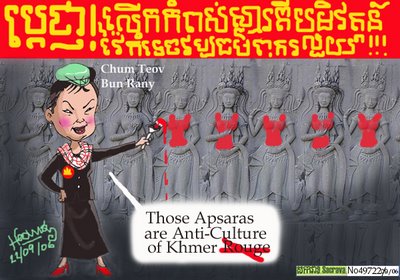
Cambodia's modern moral crackdown
By Guy De Launey
BBC News, Phnom Penh
To save its culture from "pernicious modern influences", official action is currently being taken against everything from adultery to video phone calls in Cambodia. But some argue that Cambodian society was actually a lot more permissive in days gone by.
I have just got back from Siem Reap, gateway to the ancient temples of Angkor.
While I was there I started to see one of Cambodia's national symbols in a new light.
The Apsara is a bare breasted dancing nymph - and there are thousands of them carved into the walls and lintels of the ancient monuments.
Lithe of limb, generous of bust, and with a cheeky, come-hither expression, the Apsara certainly has a lot more sex appeal than other female national symbols like Britannia or the Statue Of Liberty.
But it is just as well that Apsara's got hundreds of years of history to fall back on because there is not much chance of a topless dancer being celebrated in modern Cambodia.
If the Apsara had made her debut in the past year, she would have been labelled as "against the culture".
In fact these days going topless would be unthinkable.
Taking offence
At the turn of the year, a hapless young singer-cum-presenter was forced to make a grovelling apology on live TV after the prime minister announced that she had insulted Cambodian culture.
Her crime? Wearing a backless dress.
That incident set the tone for the rest of the year.
Things which have been declared "against the culture" have included mini-skirts, dyed hair, dating agencies, beauty contests and third generation mobile phones (the kind that allow high-speed internet access).
Of course, a lot of people are wondering why on earth all this is happening now.
Conspiracy theories abound, but one thing that cannot be discounted is the influence of Prime Minister Hun Sen's wife, Bun Rany.
She was certainly instrumental in the rebuke to the TV presenter with the offending dress.
And she was the driving force behind a petition against third generation mobile phones.
Mobile revolution
Along with other powerful Cambodian women, Bun Rany decided that these cutting-edge phones would allow would-be mistresses to bombard rich and influential men with suggestive material, leading them into temptation.
"We are all very concerned that bad people will use modern communication and information technology in the wrong way, and this will have a serious negative effect on morality and social welfare," said the petition from the group some have called the "Phnom Penh Wives".
Soon after, the prime minister ordered the phone operators to postpone their upgrade plans.
He said it might be 10 years before Cambodian society would be sophisticated enough to use the new technology responsibly.
In fact, the phone operators got off lightly.
The authorities told Phnom Penh's first and only dating agency that its radical concept of helping women find partners was 50 years ahead of its time.
And then the Miss Cambodia pageant got the thumbs down.
Not only was the contest offensive to Cambodian culture, the prime minister said, it was also wrong to hold such an event while the country was still recovering from three decades of war.
Political agenda
To top it all off, a couple of weeks ago the National Assembly voted to make adultery a criminal offence.
Unfaithful husbands or wives now face up to 12 months in jail.
--------------
One newspaper recently lambasted a young TV presenter for being too affectionate with her boyfriend
--------------
The politicians here are not exactly renowned for their marital fidelity, but as usual in Cambodia, there is more to the situation than meets the eye.
Some political analysts think the legislation is another stick with which to beat the ailing, royalist Funcinpec party, whose members seem to be particularly fond of female company.
In fact, many of the people I talk to think there are political reasons for the apparent moral crackdown.
A friend who promotes safe sex said that if the government really were on a crusade, they would have shut down the brothels and karaoke joints where sex is sold.
In fact those establishments remain in staggering numbers.
There are several within a couple of minutes' walk of my flat in a very respectable part of Phnom Penh.
National confusion
Other people see a smokescreen.
The owner of one of my neighbourhood restaurants wondered how the National Assembly had found the time to make adultery illegal when an anti-corruption law had been languishing for years.
They would be better off, he said, building roads and sorting out the country's infrastructure instead of interfering in people's private lives.
Others are taking the official line at face value.
One newspaper recently lambasted a young TV presenter for being too affectionate with her boyfriend.
Her behaviour was - you guessed it - "against the culture."
The question is, whose culture are they talking about?
The ancient Cambodian culture that turned the Apsara into a national icon?
The famously liberated Western-style culture of the pre-Khmer Rouge era, when Phnom Penh was considered the Paris of the East?
Or even the culture that will this very evening see dozens of young couples canoodling along the Phnom Penh riverfront?
The answer is something of a mystery.
All I know is that when Apsara dancers take to the stage these days, they had better make sure they are covered up.
From Our Own Correspondent was broadcast on Saturday, 16 September, 2006 at 1130 BST on BBC Radio 4. Please check the programme schedules for World Service transmission times.

1 comment:
Quite frankly, Ms. "Piggy" Bun Nary can go to hell as far as KHMER is concerned.
09/27/06
AKnijaKhmer
Post a Comment